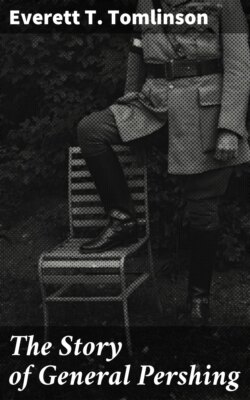Читать книгу The Story of General Pershing - Everett T. Tomlinson - Страница 6
На сайте Литреса книга снята с продажи.
A Historic Moment
ОглавлениеTable of Contents
The morning of June 13, 1917, was one of the historic mornings in the history of the world. On the landing dock at Boulogne, France, a detachment of French infantry was drawn up in line. The men were clad in the uniform of battle. Their faces confirmed the report that recently they had seen hard service in the trenches—as they had. Not a young soldier was in the lines—they were all middle-aged men, perhaps made older by the fearful experiences through which they recently had passed. This morning, however, there was an air of eagerness and expectancy in the expressions on their faces; and the eyes of all, with an intentness that was at once pathetic and tragic, were watching a boat that was drawing near the landing stage.
In the assembly on the dock an observer would have seen certain of the great men of France. There were Brigadier General Pelletier; René Bernard, Under Secretary of State for War; General Dumas; General Dupon, representing General Petain; and the military governor of Boulogne. Representatives of other nations and forces also were in the midst of the eager throng. There, too, were Sir George Fowke, representing General Sir Douglas Haig; and Captain Boyd, Military Attaché of the American War Department. Men, resplendent in their uniforms and decorations, who represented the British and French navies, also were in the assembly, all as deeply interested as were their military comrades. The nearby streets were filled with people waiting and subdued, and yet in a state of mind that at any moment would have carried the great assembly into the wildest enthusiasm.
The cause of the excitement was to be found in a little group of men assembled on the deck of a steamer that was slowly approaching the dock. In the center of the group stood a man in the uniform of the United States Army. He was six feet in height, broad shouldered, trim-waisted, muscular and wiry. His hair was gray and his closely cropped mustache was also tinged with gray. His dark eyes were glowing, though every nerve and muscle was under the control of his will—a will that was as strong as his prominent chin and nose indicated. It was the first time in the history of the world that an American soldier was landing in Europe, there to fight for his own country and for the liberty of the world. There is slight cause for wonder that a murmur ran from one to another in the expectant crowd: "Truly here comes a man!" And the man was to be followed by millions, clad in the uniform of the land from which he came.
We may be sure that when this soldier, General John Joseph Pershing, stepped ashore and General Dumas greeted the American in the words, "I salute the United States of America, which has now become united to the United States of Europe," there was a cause for the deep emotion that manifested itself in Pershing's dark eyes. It was, as he said, "a historic moment." As he greeted the French colors, the detachment of brave men that had recently come from the firing line stood immovable like men of steel, and the American general slowly passed down the line, his face alone still betraying his feeling over the deep solemnity of the moment. And what a moment it was! Their dead had not died in vain, their heroic struggle against barbarism, all the sorrows and losses the devoted French people had borne were now focused on the coming of an American general and his staff. For behind him was America, and she was coming too.
And this American general, with his staff of fifty-three officers and one hundred and forty-six men, including privates and civilian attachés , stood before the beholders as the fore-runners of a mighty host which was determined to help clear the world of the German menace to life, liberty and the pursuit of happiness. General Pershing, the fifth full general of the United States, is the successor to Washington, Grant, Sherman and Sheridan. So modest has been his career, so great his reluctance to appear in print, that many, even in his own nation, are not familiar with the deeds he has done. He has not sought promotion, but promotion sought him. Apparently, at times, in far away provinces, he has been banished to obscurity. Seven years passed before he was raised from the rank of a second lieutenant to a first lieutenancy, and yet the year 1917 found him in command of the American Expeditionary Forces in France, the first leader of American troops to land with drawn swords on the soil of Europe. The record is marvelous and it is also inspiring. What manner of man is this commander? What is the story of his life? Who were his father and mother? Where did he come from? How did he develop the powers that led one American President to advance him eight hundred and sixty-two points at one time and caused another President to select him as the one man to command the soldiers of the United States in France? What are his qualifications—mental, moral and physical?
This story is an attempt to answer these questions in such a manner that the people of his own land may be able to understand a part at least of the career of the man behind the general. It does not try to analyze critically the military career of General John Joseph Pershing, nor does it primarily portray the development of the soldier. It is rather a modest recital of the leading events in the life of Pershing, the man, who became Pershing, the General.
